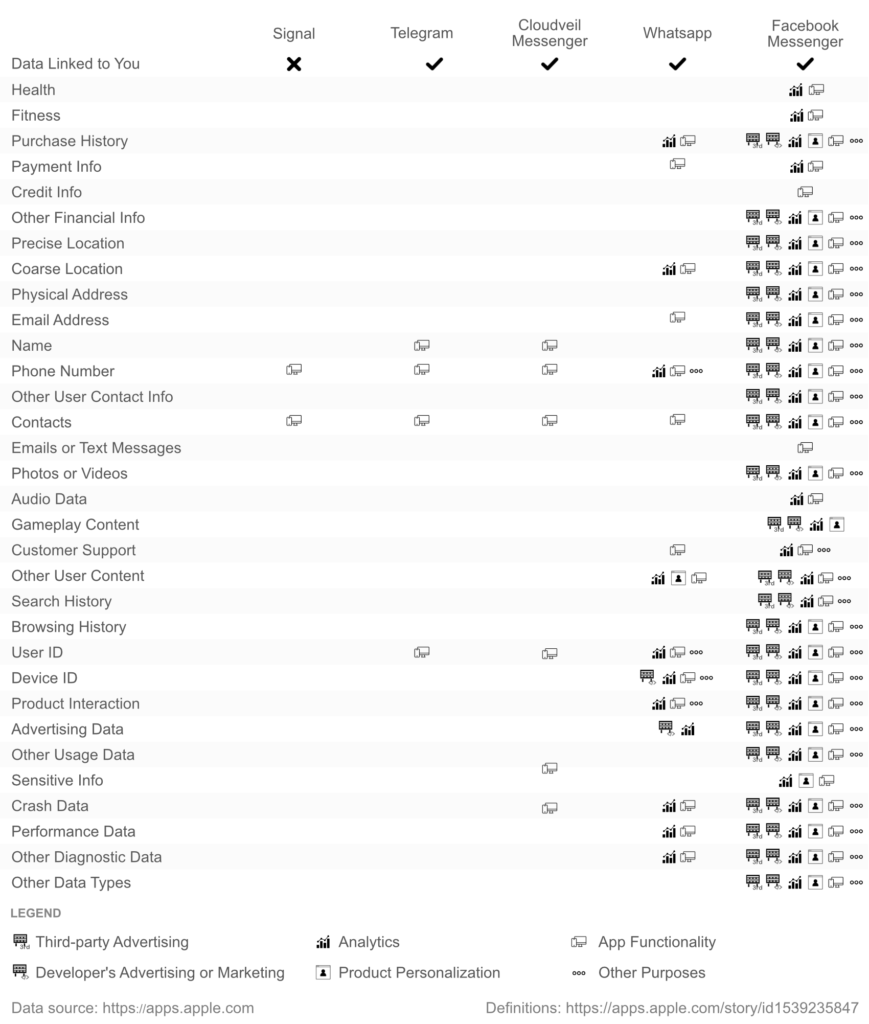Messenger App Privacy Comparison
Due to some of the misinformation spreading recently related to Whatsapp’s new privacy policy we thought it would be helpful to analyze the type of data that some of the popular messaging platforms use.
Note: This data has been sourced using the Apple App Store App Privacy Feature.

Signal is a messenger app with a strong focus on privacy. Their privacy policy is easy to read and clear. Using end-to-end encryption this app is considered to be very secure. It is the most basic messenger option on this list. This project is funded by donations and grants.
Privacy Policy: https://signal.org/legal
Telegram is also a privacy-focused messaging app. With more advanced features than Signal, it has channels for broadcasting and bot features to allow you to interact with businesses and services through the app. There is an option to use private messages for end-to-end encryption on the platform. Server-client encryption is used on standard chats and groups and the data is stored on Telegram’s servers in an encrypted format. Telegram is regarded as a secure messaging option.
Telegram works well when using multiple devices or transferring to a new device. Since the messages are stored on the server you can just sign in on a new device and your messages will show up. The private messages are only stored on the device and do not transfer. It also has apps for tablets and iPad.
Telegram has been funded primarily by Pavel Durov, the company’s founder and CEO. With the recent growth of Telegram’s userbase, they have announced that they will be introducing an Ad Platform to help fund the project. This won’t affect the messaging portion of Telegram but will be focused on social media features such as large channels with lots of followers. The creators of these channels will have the option to use the Telegram Ad Platform to include ads in their channel.
Privacy Policy: https://telegram.org/privacy
Cloudveil Messenger is a custom Telegram client that was created as a safe and simple messaging option. Running on the Telegram system, all channels and bots have been blocked by default to protect user’s from the objectionable content available in the Telegram system. Most of the Telegram info is applicable to this app. Cloudveil does collect your Telegram username, phone number, and Telegram ID for filtering purposes as well as crash data to improve the app’s performance.
Cloudveil Messenger’s funding has come from Cloudveil’s filtering income as well as grants and donations from church groups and charitable organizations. Cloudveil doesn’t do any advertising in the app.
Privacy Policy: https://www.cloudveil.org/privacy-policy/
Whatsapp is one of the original instant messenger apps that has been around for a long time. It uses end-to-end encryption and Whatsapp does not have access to the message content.
Recently Whatsapp asked users to agree to a new privacy policy with a message in the app. This has caused quite a stir and a lot of media attention which caused Whatsapp to push off the deadline for agreeing to the new policy. There has been a lot of confusion about what is all changing with this updated privacy policy. As far as I can tell most changes have been related to messaging businesses with Whatsapp and how that data is managed. This guide was created to shed some light on the differences between these popular messaging apps.
Privacy Policy: https://www.whatsapp.com/legal/updates/privacy-policy/
Facebook Messenger is another messaging app that has seen some more usage recently. While a Facebook account is not needed to use the app, they tend to push you in that direction. It is very much aligned with Facebook’s priorities and has less focus on privacy. This is the app used to message with customers and sellers on both Facebook Marketplace and business listings.
Privacy Policy: https://www.facebook.com/about/privacy/
Privacy Definitions
Third‑Party Advertising
Such as displaying third‑party ads in the app or sharing data with entities who display third‑party ads.
Developer’s Advertising or Marketing
Such as displaying the developer’s own ads in the app, sending marketing communications directly to you, or sharing data with entities who will display ads to you.
Using data to evaluate your behaviour, including to understand the effectiveness of existing product features, plan new features, or measure audience size or characteristics.
Customizing what you see, such as a list of recommended products, posts, or suggestions.
Such as to authenticate you in the app, enable features, prevent fraud, implement security measures, ensure server uptime, minimize app crashes, improve scalability and performance, or perform customer support.
Any other usage not listed.


